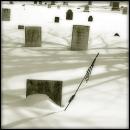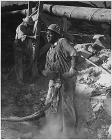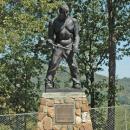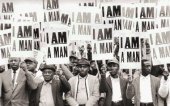Drivin' steel, drivin' steel,
Drivin' stell, boys,
Is hard work, I know;
Drivin' steel, drivin' steel,
Drivin' steel, boys,
Is hard work, I know.
Treat me right, treat me right,
Treat me right, boys,
I am bound to stay all day;
Treat me wrong, treat me wrong,
Treat me wrong, boys,
I am bound to run away.
Boss man, boss man,
Boss man, boys,
See the boss man comin' down the line,
Boss man, boss man,
Boss man, boys,
See the boss man comin' down the line.
Drivin' stell, boys,
Is hard work, I know;
Drivin' steel, drivin' steel,
Drivin' steel, boys,
Is hard work, I know.
Treat me right, treat me right,
Treat me right, boys,
I am bound to stay all day;
Treat me wrong, treat me wrong,
Treat me wrong, boys,
I am bound to run away.
Boss man, boss man,
Boss man, boys,
See the boss man comin' down the line,
Boss man, boss man,
Boss man, boys,
See the boss man comin' down the line.
Contributed by Bernart Bartleby - 2015/7/20 - 16:56
×
![]()
Note for non-Italian users: Sorry, though the interface of this website is translated into English, most commentaries and biographies are in Italian and/or in other languages like French, German, Spanish, Russian etc.









Canto ritmico degli operai afroamericani (e non) addetti alla posa dei binari ferroviari.
La fonte principale è la raccolta di canzoni e ballate realizzata tra il 1907 ed il 1930 dal reverendo metodista Gilbert Reynolds Combs nella contea di Madison, Kentucky. Ripresa da Carl Sandburg in una fondamentale raccolta da lui curata e intitolata The American Songbag, pubblicata nel 1927.
Al proposito si vedano anche John Henry e Jackhammer John